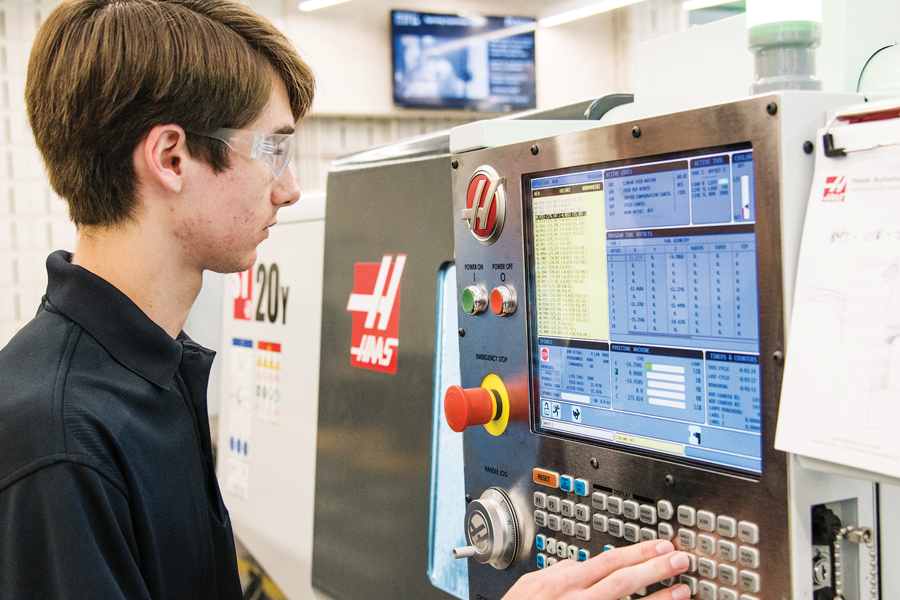Equipped with Haas Automation Inc. machine tools, the BIDC prepares students for the workforce
Section Investments in Infrastructure
Zach Vander Missen (BSEE ’16) may have been able to make something work.
He might have found a machine shop willing to make fixtures and assembly apparatuses with his detailed specifications, his occasionally “strange materials,” and the high-precision tolerances necessary for his research. But even so, he probably would have had to go through several rounds of prototypes.
Instead, Vander Missen, a graduate student in electrical and computer engineering, is machining his own components at Purdue’s Bechtel Innovation Design Center (BIDC). He is often positioned in front of one of Haas Automation Inc.’s CNC machines inside the Haas Manufacturing Laboratory.
The “computer numerical control,” or CNC, machining process uses software to dictate the movement of the tool.
“It’s easier to get exactly what we want when we are the ones who are making it. This equipment is just terrific,” Vander Missen says, taking a break from his research and wiping his hands before offering a handshake. “Most of the stuff I’ve been working on, the specific project I’m working on here, I could not have done without this equipment. The work was too precise for hand tools. The Haas machines are instrumental to moving my research forward.”
Vander Missen is not the only one profoundly influenced by the lab. The transformational upgrade in facilities — including its manufacturing equipment — is changing the way students work and think across the College of Engineering — and the entire University. The former Artisan Fabrication Laboratory in the Neil Armstrong Hall of Engineering has metamorphosed into the Gene Haas Manufacturing Laboratory in the BIDC.

A foundation for the workforce
After being solicited by Purdue, the Gene Haas Foundation proposed making a $250,000 Manufacturing Laboratory naming rights gift in support of the BIDC. Gene Haas, owner of Haas Automation Inc. of Oxnard, Calif., established the Gene Haas Foundation in 1999. Kathy Looman, the foundation administrator, says it was a no-brainer. The Haas Foundation’s goal is to promote and enhance manufacturing skills in the workforce, she says, which aligns perfectly with Purdue’s goal for the facility and the lab.
“Purdue is one of the top engineering schools in the country, so we were very happy to have our name and company brand associated with Purdue,” Looman says. “Gene wants his private foundation resources to be spent improving the American manufacturing industry. Attracting great engineers through the pipeline is what we are looking to do with our partners.”
The gift has enabled the BIDC to provide Purdue students with leading-edge manufacturing and prototyping technologies, says BIDC director Matthew Swabey. The Haas grant goes toward the infrastructure and toward cultivating student mentors, teaching assistants who can train their peers how to use the tools.
Purdue’s long-standing relationship with Haas Automation Inc. means Purdue has not paid book price for the systems in the BIDC lab — nor in the Neil Armstrong Hall lab before that. The company also has supported Purdue with installation expertise, enhancing machine capabilities, extended warranties and repairs.
Giant leaps for future engineers
Students are able to do significantly more with the new influx of Haas machines and the Gene Haas Manufacturing Lab. Lab manager Jeff Huddleston says that when the manufacturing equipment was located in Neil Armstrong Hall, space was limited, and it got especially crowded when students were working on senior design projects. But the BIDC — and its new manufacturing lab — doesn’t have that issue.
The new equipment and space have allowed students not only to log more time in the lab but also to dream bigger than they have before. That is a notion Gene Haas would certainly appreciate.
The lab benefits a wide range of students, from the Purdue Space Program group, which built a 12-foot, liquid-fueled rocket using the CNCs extensively, to a group of students in electrical and computer engineering who competed in an underwater submersible vehicle contest with robots, many of whose parts were built in the lab.
Learning opportunities for all
Any Purdue student can access the machines, Swabey says. About half the hours are class-related, but students initiate the projects.
“You can make a team of any students on campus. You can have business majors, liberal arts people, a couple of engineers and technologists. Whatever way you want to do it, you can build your team as you need to, and we are happy to help,” Swabey says. “It’s all about lowering barriers to entry and enabling things that could not have happened before. Students have an idea that they want to make reality, and they come to our door.”
And, usually, the idea gets accomplished — with the Haas CNC machines and instruction from people like Rohan Kimothi (MSME ’18), one of the graduate teaching assistants in the manufacturing lab.
“As a student, you have a very good chance to learn and to work directly with industry-level machines, which most engineering students do not get,” Kimothi says. “This is a one-of-a-kind facility in the entire country.”
The Haas Foundation’s Looman agrees. “It is not only what Purdue is doing with its workforce development, getting involved with students at a much younger age and exposing them to engineering; but the center itself is a showcase for manufacturing,” she says. “It is an excellent example of what an engineering and design center should look like. In a nutshell, the partnership aligns with everything we stand for.”
Related Stories
Navigation
Fall 2018
Pinnacle of Excellence at Scale
Dean Mung Chiang: On a Global Listening Tour
Giant Leaps in Engineering, Discovery Park District
The College of Engineering Makes Its Mark
Neil Armstrong: Inspiration Cast in Bronze
Our Gratitude for a Stellar Year
Sections
2018 Distinguished Engineering Alumni/Alumnae
Investments in Infrastructure
Expansions and improvements to teaching and learning spaces, laboratories, offices
Elevating Student Experience
Scholarships, student opportunities, diversity programs, student clubs
Dedicated to the Cause
Fundraising, event hosting, activity planning, advisory boards, networking with alumni
Funding Research
Laboratory infrastructure and equipment, project startup funds, graduate student support
Flexible Gifts
Administrative funds, student travel and networking, unexpected opportunities
Fueling Faculty
Rewarding, retaining, recruiting faculty and promoting diversity in engineering
